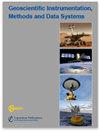波兰苏台德地区的被动地震实验“动物”
IF 2.3
4区 地球科学
Q3 GEOSCIENCES, MULTIDISCIPLINARY
Geoscientific Instrumentation Methods and Data Systems
Pub Date : 2021-09-02
DOI:10.5194/GI-10-183-2021
引用次数: 1
摘要
摘要本文介绍了“动物”地震实验的信息,该实验旨在提供对波兰苏台德(万里海造山带东北缘)地壳和上地幔结构的新认识。由23个临时宽带台站组成的地震台网连续运行约2年(2017年10月至2019年10月)。该数据集由位于研究区及其附近的八个常设站点的记录补充。这些台站之间的间距约为25-30公里。结果,获得了本地、区域和远震事件的记录。本文介绍了该项目的目的和动机,台站部署程序,以及临时地震台网和常设台站的特点。此外,本文还介绍了数据传输设置、状态监测系统、数据质量控制、站下近地表地质构造及相关场地效应等重要问题。特别注意的是验证传感器的正确方向。获得的数据集将使用几种地震解释方法进行分析,包括地震各向异性参数分析,目的是扩展对岩石圈和亚岩石圈结构以及研究区构造演化的认识。本文章由计算机程序翻译,如有差异,请以英文原文为准。
Passive seismic experiment “AniMaLS” in the Polish Sudetes (NE Variscides)
Abstract. The paper presents information about the seismic
experiment “AniMaLS” which aims to provide a new insight into the crust and
upper mantle structure beneath the Polish Sudetes (NE margin of the Variscan
orogen). The seismic network composed of 23 temporary broadband stations was
operated continuously for about 2 years (October 2017 to October 2019).
The dataset was complemented by records from eight permanent stations located in
the study area and in the vicinity. The stations were deployed with an
inter-station spacing of approximately 25–30 km. As a result, recordings of
local, regional and teleseismic events were obtained. We describe the aims
and motivation of the project, the station deployment procedure, as well as
the characteristics of the temporary seismic network and of the permanent
stations. Furthermore, this paper includes a description of important issues
like data transmission setup, status monitoring systems, data quality
control, near-surface geological structure beneath stations and related site
effects, etc. Special attention was paid to verification of correct
orientation of the sensors. The obtained dataset will be analysed using
several seismic interpretation methods, including analysis of seismic
anisotropy parameters, with the objective of extending knowledge about the
lithospheric and sublithospheric structure and the tectonic evolution of
the study area.
求助全文
通过发布文献求助,成功后即可免费获取论文全文。
去求助
来源期刊

Geoscientific Instrumentation Methods and Data Systems
GEOSCIENCES, MULTIDISCIPLINARYMETEOROLOGY-METEOROLOGY & ATMOSPHERIC SCIENCES
CiteScore
3.70
自引率
0.00%
发文量
23
审稿时长
37 weeks
期刊介绍:
Geoscientific Instrumentation, Methods and Data Systems (GI) is an open-access interdisciplinary electronic journal for swift publication of original articles and short communications in the area of geoscientific instruments. It covers three main areas: (i) atmospheric and geospace sciences, (ii) earth science, and (iii) ocean science. A unique feature of the journal is the emphasis on synergy between science and technology that facilitates advances in GI. These advances include but are not limited to the following:
concepts, design, and description of instrumentation and data systems;
retrieval techniques of scientific products from measurements;
calibration and data quality assessment;
uncertainty in measurements;
newly developed and planned research platforms and community instrumentation capabilities;
major national and international field campaigns and observational research programs;
new observational strategies to address societal needs in areas such as monitoring climate change and preventing natural disasters;
networking of instruments for enhancing high temporal and spatial resolution of observations.
GI has an innovative two-stage publication process involving the scientific discussion forum Geoscientific Instrumentation, Methods and Data Systems Discussions (GID), which has been designed to do the following:
foster scientific discussion;
maximize the effectiveness and transparency of scientific quality assurance;
enable rapid publication;
make scientific publications freely accessible.
 求助内容:
求助内容: 应助结果提醒方式:
应助结果提醒方式:


